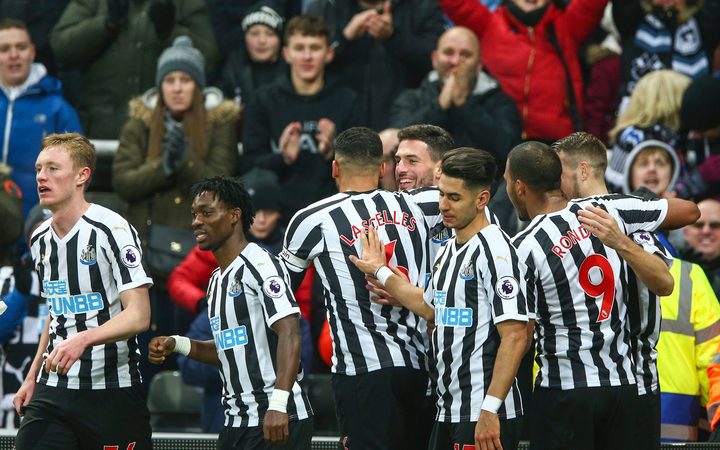
Saudi Arabian consortium completes Newcastle takeover
For the Toon Army, the nickname of Newcastle United’s long-suffering and fiercely loyal followers, news that the club’s takeover by a Saudi Arabia-led consortium had finally been completed felt like an early Christmas present.

Photo: PHOTOSPORT
To be more precise, it felt like all their Christmases had arrived at once from the Middle East on a black and white sleigh loaded with the world’s best footballers.
Confirmation that a consortium led by Saudi Arabia’s Public Investment Fund had been given the go-ahead to complete a deal that hit the rocks last year means one of England’s most under-achieving clubs embarks on a new era.
After Wednesday’s news that the obstacles to the deal had been removed — namely a lifting of Saudi Arabia’s ban on Premier League Qatar-based rights holder beIN SPort and that the Premier league was satisfied it was not a Saudi state takeover — Newcastle fans began gathering outside the city centre stadium, braving the early autumn chill.
Just after 5pm they opened cans of beer and broke into renditions of club anthem “Blaydon Races” to celebrate the end of 14 years of dross under the ownership of Mike Ashley.
The last time there was such excitement on a non match day was when Alan Shearer signed for a then world record 15 million pounds ($30 million) in 1996 when the club were mixing it with big hitters.
“Yesssssssss. We can dare to hope again!” Shearer, whose statue stands outside the gates, said.
It was a sentiment shared by all Magpies fans after more than a decade of doom and gloom.
“We’ve got our club back,” they chanted.

Alan Shearer playing for Newcastle
Photo: Photosport
Rival fans smirk at what they regard as delusions of grandeur at the north-east club who were last English champions in 1927 and have not won any domestic silverware since 1955.
Even their unbridled optimism has waned in the past decade with hope disappearing down the River Tyne as the sleeping giant of a club became the epitome of mediocrity under an absent owner unwilling to fuel their dreams.
In the blink of an eye, Ashley has gone and they now support one of the richest clubs in the world, even if the immediate priority for the new consortium will not be to win silverware but to ensure their Premier League status.
After seven games Newcastle are winless and second from bottom of the table.
Londoner Ashley was so despised by Newcastle’s fans that they would welcome just about anyone into the club, provided they bring with them the precious commodity of hope.
While there are well-publicised moral concerns over so-called Saudi Arabian “sportswashing” as the oil rich nation seeks to soften its overseas image, the Magpies’ fanbase are clearly not concerned from where their saviours arrive.
A poll undertaken by the Newcastle United Supporters Trust showed 93.8% of the club’s fans were in favour of the takeover.
Just like the bird of their nickname, the glint of silverware is intoxicating.
It is not hard to understand their joy.
Since Ashley’s takeover in 2007, Newcastle have twice been relegated from the Premier League and, apart from finishing fifth under Alan Pardew in 2011-12, have stumbled around in the lower reaches of the table.

Photo: PHOTOSPORT
Present manager Steve Bruce is deeply unpopular — held up as proof of Ashley’s lack of ambition, hired to fight relegation battles with cut-price signings rather than challenge the likes of Manchester City and Liverpool.
It has, however, not always been like this.
For a while at the start of the Premier League era, in the early 1990s, when former player Kevin Keegan arrived like a returning Messiah, it appeared that anything was possible alongside the banks of the River Tyne.
With millionaire local property developer John Hall as chairman, the old stadium was revamped and Keegan was given the funds to create a team in his image with the likes of Peter Beardsley, Andy Cole, David Ginola, Robert Lee and Colombian firecracker Faustino Asprilla, to name but a few, arriving.
Newcastle finished third in the Premier League in 1994, their first season back in the top flight, having almost fallen into the third-tier a couple of years earlier.
Dubbed the “The Great Entertainers”, Newcastle finished runners-up in 1996 after suffering a late collapse that saw them pipped by Manchester United in a finale to a season that will forever be remembered for Keegan’s wide-eyed “I will love it” rant at Alex Ferguson.
With Shearer signed to lead the line they also came second to Manchester United a year later and Keegan left in 1997, the same year Freddy Shepherd replaced Hall as chairman.
Kenny Dalglish and Ruud Gullit both failed and although former England manager Bobby Robson staged a renaissance with fourth and third-placed finishes, he was sacked in 2004, precipitating a downward spiral.
The days when Ginola, Beardsley, Les Ferdinand, Shearer and the like had the Toon Army in dreamland now seem like a distant memory — but as Shearer said the dream is alive again.
-Reuters
Stay connected with us on social media platform for instant update click here to join our Twitter, & Facebook
We are now on Telegram. Click here to join our channel (@TechiUpdate) and stay updated with the latest Technology headlines.
For all the latest Sports News Click Here
For the latest news and updates, follow us on Google News.

